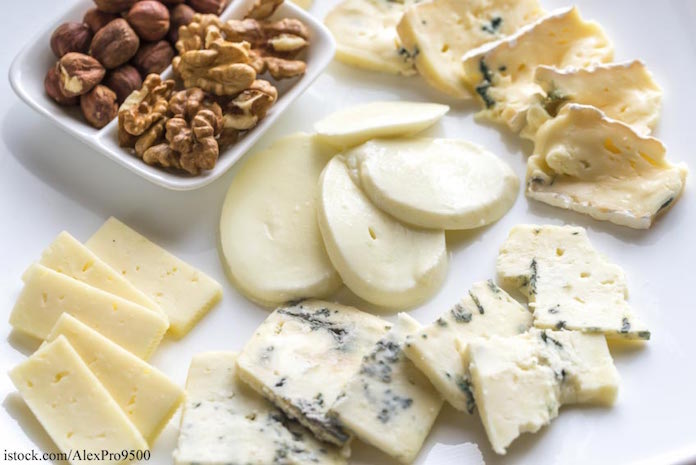Listeria monocytogenes outbreaks don’t occur very often. About 1,600 Americans are sickened every year by this pathogenic bacteria. But when they do occur people are seriously sickened and some die.

So how many listeriosis outbreaks have been linked to cheeses? In the last five years, there have been six outbreaks linked to cheese products caused by this pathogenic bacteria. In five of the outbreaks, the cheeses were made from pasteurized milk, but were contaminated after that process. In the current outbreak, the cheeses were made from raw, or unpasteurized, milk. Most of these outbreaks are linked to soft cheeses.
In 2015, a listeriosis outbreak linked to soft cheeses produced by Karoun Dairies of California sickened 30 people in 10 states, killing three and causing one miscarriage. Five rare DNA fingerprints of Listeria monocytogenes bacteria were included in that outbreak. Twenty-eight people were hospitalized in that outbreak; six illnesses were pregnancy related. The FDA isolated Listeria monocytogenes from two environmental samples taken from Central Valley Cheese, which made cheeses for Karoun. Whole genome sequencing showed the two isolates were closely related genetically to isolates from ill persons.
Also in 2015, a Listeria monocytogenes outbreak in Washington state was linked to Latin-style soft cheeses produced by Querseria Bendita of Yakima, Washington. Three people were sickened in that outbreak. One illness was associated with a pregnancy, two people were hospitalized, and one death was reported.
In 2014, a multistate outbreak of listeriosis was linked to Hispanic-style cheese products made and distributed by Roos Foods of Kenton, Delaware. At least eight people in two states were sickened. The FDA suspended the food facility registration of Roos Foods in March 2014 after the FDA found that “there was a reasonable probability of food manufactured, processed, packed, or held by Roos Foods causing serious adverse health consequences or death to humans.” Standing water on the floor in the cheese curd pasteurization room was found, and the roof was leaking badly. Twelve environmental swabs taken from the Roos facility tested positive for Listeria; eleven of those had the same DNA fingerprint as the outbreak strain.
In 2013, Crave Brothers soft-ripened cheeses sickened six people in four states. The case count by state was: Minnesota (2), Illinois (1), Indiana (1), and Ohio (1). Four of those patients were female, including one who was pregnant at the time. One death and one miscarriage were reported. Testing at the Minnesota Department of Agriculture found the outbreak pattern of L. monocytogenes in two cheeses wedges collected from two different grocery stores. Inspections at a the cheese-making facility revealed “substantial sanitation difficulties during the chess-making process itself, after the milk was pasteurized, likely led to contamination,” according to the CDC. While pasteurization eliminates pathogenic bacteria in milk, products can become contaminated after that step.
In 2012, a Listeria monocytogenes outbreak linked to imported Frescolina Marte brand ricotta salata cheese sickened 22 people in 13 states and the District of Columbia. Four deaths were reported: one each from Minnesota, New York, Nebraska, and California. But in Minnesota and New York, officials did not report listeriosis as a case of death because it was not listed on the death certificates. One fetal loss was reported. Epidemiologic, laboratory, and traceback investigations indicated that Frescolina Marte brand cheese imported from Italy and distributed by Forever Cheese was the likely source of that outbreak. FDA found the outbreak strain of Listeria from a sample of uncut Frescolina Marte brand ricotta salata cheese.
In the current outbreak, the CDC states that six people in four states were sickened with Listeria monocytogenes food poisoning after eating soft wash-rind raw milk cheese made by Vulto Creamery of Walton, New York. Two of the six patients died, and one baby was born with listeriosis. The outbreak strain of Listeria bacteria was identified in samples taken from three intact wheels of Ouleout cheese collected from the creamery. Vulto Creamery recalled all lots of eight types of raw milk cheeses on March 11, 2017.
The symptoms of listeriosis can take up to 70 days to appear. They include severe headache, high fever, stiff neck, abdominal cramps, nausea, and diarrhea. Pregnant women may only have a mild flu-like illness, but this infection can cause miscarriage, premature labor, stillbirth, and infection in the newborn.




